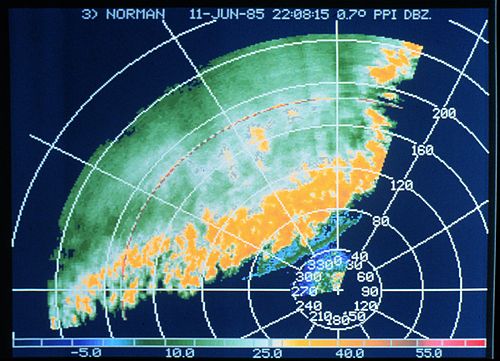Rainnoun
Condensed water falling from a cloud.
Rainnoun
(figuratively) Any matter moving or falling, usually through air, and especially if liquid or otherwise figuratively identifiable with raindrops.
Rainnoun
(figuratively) An instance of particles or larger pieces of matter moving or falling through air.
Rainverb
(impersonal) To have rain fall from the sky.
Rainverb
(intransitive) To fall as or like rain.
Rainverb
(transitive) To issue (something) in large quantities.
Rainverb
(obsolete) To reign.
Rainnoun
Reign.
Rainnoun
Water falling in drops from the clouds; the descent of water from the clouds in drops.
Rainverb
To fall in drops from the clouds, as water; - used mostly with it for a nominative; as, it rains.
Rainverb
To fall or drop like water from the clouds; as, tears rained from their eyes.
Rainverb
To pour or shower down from above, like rain from the clouds.
Rainverb
To bestow in a profuse or abundant manner; as, to rain favors upon a person.
Rainnoun
water falling in drops from vapor condensed in the atmosphere
Rainnoun
drops of fresh water that fall as precipitation from clouds
Rainnoun
anything happening rapidly or in quick successive;
Rainverb
precipitate as rain;
Rainnoun
the condensed moisture of the atmosphere falling visibly in separate drops
Rainnoun
falls of rain
Rainnoun
a large or overwhelming quantity of things that fall or descend
Rainverb
rain falls
Rainverb
(of the sky, the clouds, etc.) send down rain
Rainverb
fall or cause to fall in large or overwhelming quantities
Rainverb
used to convey that a specified thing is falling in large quantities
Rain
Rain is liquid water in the form of droplets that have condensed from atmospheric water vapor and then become heavy enough to fall under gravity. Rain is a major component of the water cycle and is responsible for depositing most of the fresh water on the Earth.
Precipitationnoun
(meteorology) Any or all of the forms of water particles, whether liquid or solid, that fall from the atmosphere (e.g., rain, hail, snow or sleet). It is a major class of hydrometeor, but it is distinguished from cloud, fog, dew, rime, frost, etc., in that it must fall. It is distinguished from cloud and virga in that it must reach the ground.
Precipitationnoun
A hurried headlong fall.
Precipitationnoun
A reaction that leads to the formation of a heavier solid in a lighter liquid; the precipitate so formed at the bottom of the container.
Precipitationnoun
(figuratively) Unwise or rash rapidity; sudden haste.
Precipitationnoun
The act of precipitating, or the state of being precipitated, or thrown headlong.
Precipitationnoun
A falling, flowing, or rushing downward with violence and rapidity.
Precipitationnoun
Great hurry; rash, tumultuous haste; impetuosity.
Precipitationnoun
The act or process of precipitating from a solution.
Precipitationnoun
A deposit on the earth of hail, mist, rain, sleet, or snow; also, the quantity of water deposited.
Precipitationnoun
the quantity of water falling to earth at a specific place within a specified period of time;
Precipitationnoun
the process of forming a chemical precipitate
Precipitationnoun
the falling to earth of any form of water (rain or snow or hail or sleet or mist)
Precipitationnoun
the act of casting down or falling headlong from a height
Precipitationnoun
an unexpected acceleration or hastening;
Precipitationnoun
overly eager speed (and possible carelessness);
Precipitationnoun
the action or process of precipitating a substance from a solution.
Precipitationnoun
rain, snow, sleet, or hail that falls to or condenses on the ground
Precipitationnoun
the fact or quality of acting suddenly and rashly
Precipitation
In meteorology, precipitation is any product of the condensation of atmospheric water vapor that falls under gravitational pull from clouds. The main forms of precipitation include drizzling, rain, sleet, snow, ice pellets, graupel and hail.





















